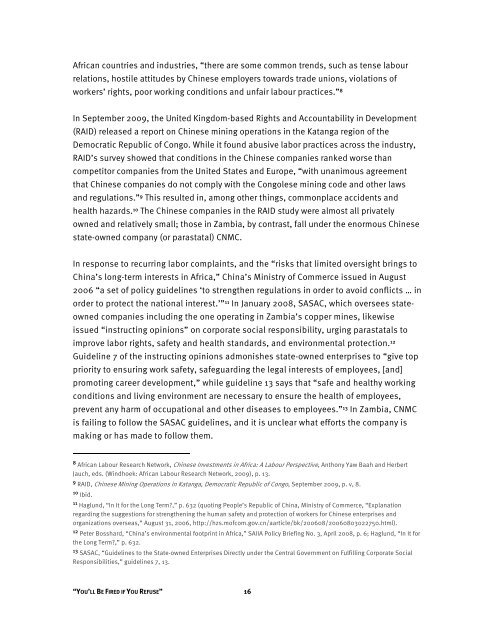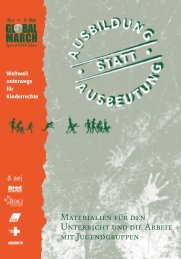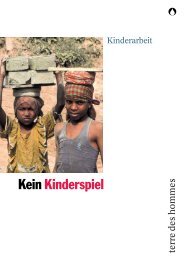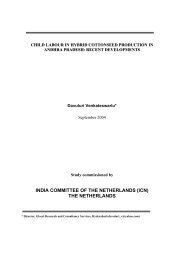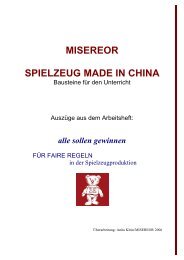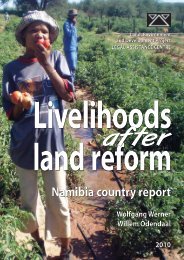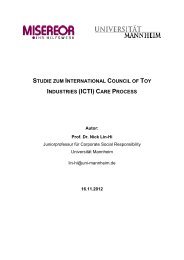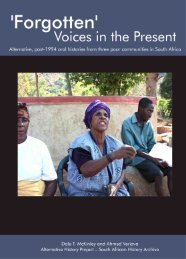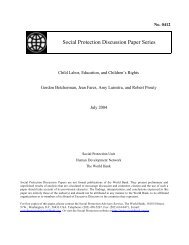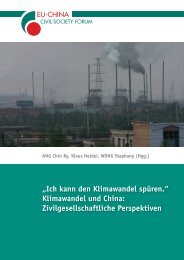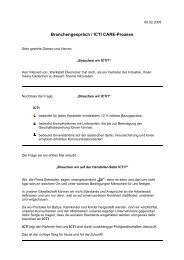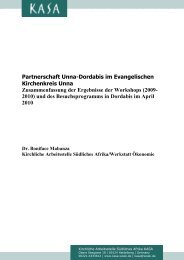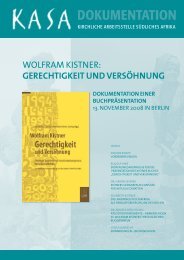“You'll Be Fired if You Refuse†- Human Rights Watch
“You'll Be Fired if You Refuse†- Human Rights Watch
“You'll Be Fired if You Refuse†- Human Rights Watch
Create successful ePaper yourself
Turn your PDF publications into a flip-book with our unique Google optimized e-Paper software.
African countries and industries, “there are some common trends, such as tense labour<br />
relations, hostile attitudes by Chinese employers towards trade unions, violations of<br />
workers’ rights, poor working conditions and unfair labour practices.” 8<br />
In September 2009, the United Kingdom-based <strong>Rights</strong> and Accountability in Development<br />
(RAID) released a report on Chinese mining operations in the Katanga region of the<br />
Democratic Republic of Congo. While it found abusive labor practices across the industry,<br />
RAID’s survey showed that conditions in the Chinese companies ranked worse than<br />
competitor companies from the United States and Europe, “with unanimous agreement<br />
that Chinese companies do not comply with the Congolese mining code and other laws<br />
and regulations.” 9 This resulted in, among other things, commonplace accidents and<br />
health hazards. 10 The Chinese companies in the RAID study were almost all privately<br />
owned and relatively small; those in Zambia, by contrast, fall under the enormous Chinese<br />
state-owned company (or parastatal) CNMC.<br />
In response to recurring labor complaints, and the “risks that limited oversight brings to<br />
China’s long-term interests in Africa,” China’s Ministry of Commerce issued in August<br />
2006 “a set of policy guidelines ‘to strengthen regulations in order to avoid conflicts … in<br />
order to protect the national interest.’” 11 In January 2008, SASAC, which oversees stateowned<br />
companies including the one operating in Zambia’s copper mines, likewise<br />
issued “instructing opinions” on corporate social responsibility, urging parastatals to<br />
improve labor rights, safety and health standards, and environmental protection. 12<br />
Guideline 7 of the instructing opinions admonishes state-owned enterprises to “give top<br />
priority to ensuring work safety, safeguarding the legal interests of employees, [and]<br />
promoting career development,” while guideline 13 says that “safe and healthy working<br />
conditions and living environment are necessary to ensure the health of employees,<br />
prevent any harm of occupational and other diseases to employees.” 13 In Zambia, CNMC<br />
is failing to follow the SASAC guidelines, and it is unclear what efforts the company is<br />
making or has made to follow them.<br />
8 African Labour Research Network, Chinese Investments in Africa: A Labour Perspective, Anthony Yaw Baah and Herbert<br />
Jauch, eds. (Windhoek: African Labour Research Network, 2009), p. 13.<br />
9 RAID, Chinese Mining Operations in Katanga, Democratic Republic of Congo, September 2009, p. v, 8.<br />
10 Ibid.<br />
11 Haglund, “In It for the Long Term?,” p. 632 (quoting People’s Republic of China, Ministry of Commerce, “Explanation<br />
regarding the suggestions for strengthening the human safety and protection of workers for Chinese enterprises and<br />
organizations overseas,” August 31, 2006, http://hzs.mofcom.gov.cn/aarticle/bk/200608/20060803022750.html).<br />
12 Peter Bosshard, “China’s environmental footprint in Africa,” SAIIA Policy Briefing No. 3, April 2008, p. 6; Haglund, “In It for<br />
the Long Term?,” p. 632.<br />
13 SASAC, “Guidelines to the State-owned Enterprises Directly under the Central Government on Fulfilling Corporate Social<br />
Responsibilities,” guidelines 7, 13.<br />
“YOU’LL BE FIRED IF YOU REFUSE” 16


